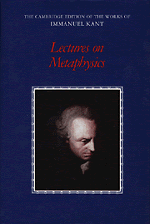Book contents
- Frontmatter
- Contents
- General editors' preface
- Acknowledgments
- Translators' introduction
- Guide to abbreviations and the translators' notes
- I Metaphysik Herder, 1762–1764 (selections) (Ak. 28: 39–53)
- II Metaphysik L1, mid-1770s (complete except for the Natural Theology and Heinze extracts) (Ak. 28: 195–301)
- III Metaphysik Mrongovius, 1782–1783 (complete) (Ak. 29: 747–940)
- IV Metaphysik Volckmann, 1784–1785 (selections) (Ak. 28: 440–450)
- V Metaphysik L2, 1790–1791? (complete except for the Natural Theology) (Ak. 28: 531–594)
- VI Metaphysik Dohna, 1792–1793 (selections) (Ak. 28: 656–690)
- VII Metaphysik K2, early 1790s (selections) (Ak. 28: 753–775)
- VIII Metaphysik Vigilantius (K3), 1794–1795 (complete) (Ak. 29: 943–1040)
- English-German glossary
- German-English glossary
- Latin-German equivalents occurring in the text
- Concordance of Baumgarten's Metaphysics and Kant's Metaphysics lectures
- Explanatory notes (with bibliography of Kant's works cited)
- Name Index
- Subject index
VIII - Metaphysik Vigilantius (K3), 1794–1795 (complete) (Ak. 29: 943–1040)
Published online by Cambridge University Press: 05 May 2013
- Frontmatter
- Contents
- General editors' preface
- Acknowledgments
- Translators' introduction
- Guide to abbreviations and the translators' notes
- I Metaphysik Herder, 1762–1764 (selections) (Ak. 28: 39–53)
- II Metaphysik L1, mid-1770s (complete except for the Natural Theology and Heinze extracts) (Ak. 28: 195–301)
- III Metaphysik Mrongovius, 1782–1783 (complete) (Ak. 29: 747–940)
- IV Metaphysik Volckmann, 1784–1785 (selections) (Ak. 28: 440–450)
- V Metaphysik L2, 1790–1791? (complete except for the Natural Theology) (Ak. 28: 531–594)
- VI Metaphysik Dohna, 1792–1793 (selections) (Ak. 28: 656–690)
- VII Metaphysik K2, early 1790s (selections) (Ak. 28: 753–775)
- VIII Metaphysik Vigilantius (K3), 1794–1795 (complete) (Ak. 29: 943–1040)
- English-German glossary
- German-English glossary
- Latin-German equivalents occurring in the text
- Concordance of Baumgarten's Metaphysics and Kant's Metaphysics lectures
- Explanatory notes (with bibliography of Kant's works cited)
- Name Index
- Subject index
Summary
Remarks on metaphysics according to Baumgarten from the lectures of Prof. Kant for <pro> 1794/95
[Introduction]
(I)b Metaphysics belongs to the material part of philosophy, or rather contains that within itself, and therefore, since it presupposes actual objects, rests on laws, i.e., on grounds of cognition (principles <principiis>) of and about that which belongs to the existence of things. From it, therefore, is separated' the merely formal part of philosophy, or the laws of thinking expounded in logic, since the latter abstracts from the objects themselves. It is thereby already distinguished from mathematics, since this rests not, as philosophy, on laws of the cognition of things, but rather on concepts of things made through construction.
Metaphysical cognitions must therefore be cognitions simply of reason, thus arise a priori through pure concepts of reason, i.e., the principles <principia> or grounds of cognition are so constituted that one connects the necessity of what one cognizes with the cognition itself, and the concepts are directed at objects that not only are cognized independently of all experience, but that also can never possibly become an object of experience. E.g., God, freedom, immortality. They differ thus diametrically <e diametro> from all empirical appearances and principles derived therefrom: metaphysics thus has no a posteriori principles <principia>, but rather only a priori: they are given and are cognized through reason alone, but are not made.
- Type
- Chapter
- Information
- Lectures on Metaphysics , pp. 415 - 506Publisher: Cambridge University PressPrint publication year: 1997

